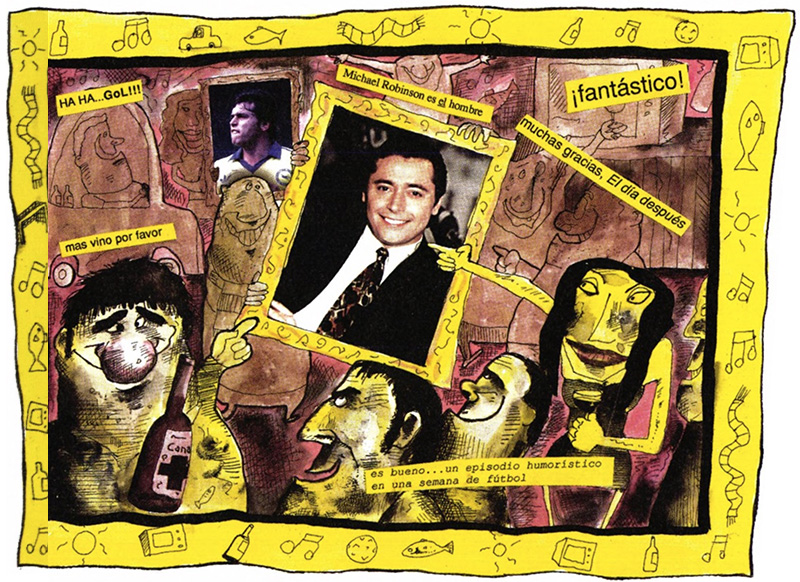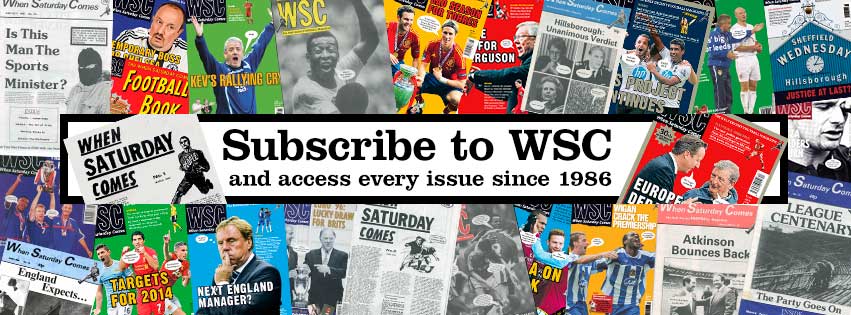
The former Liverpool, Brighton and Manchester City forward, who died today, is fondly remembered for his presenting skills – as Phil Ball explained in WSC 102, August 1995
28 April ~ Back in the days when you could afford a fish and chip lunch without the luxury of a six-figure salary, my job, every Saturday, was to bike it to the chippy for fish ‘n’ chips x 4. I tended to fulfil this weekly obligation at 12 noon sharpish, in order to be back for the start of Sam Leitch’s Football Preview on BBC One.
To miss it was unthinkable. I would be prepared to forego Match of the Day but not Leitch’s programme. His plump, articulate, almost deadpan authority seemed vital to the rhythm of the week, a rhythm that first began to stutter when he was replaced by the altogether blander figure of Bob Wilson – the first in the long line of ex-pro presenters that has proved to be the undoing of that enthusiastic English journalistic tradition of TV football presentation, from Pathé News to Football Preview.
{loadposition 1}
Twenty-five years on, living in Spain, I can happily report that the days of rushing back from the chippy have been revived, only now it is on a Monday night. I rush back from work in my car, the programme is El día después (The Day After) and the presenter, bizarre though it may seem, is one Michael Robinson, the centre-forward with the 40” bust whom Malcolm Allison once said would play for England (Ireland, actually), and whose chasing of the ball was memorably described as “rather like the man chasing the number 37 bus”.
In Spain, the average working day misses out most of the afternoon, so that most people resume later on and finish around eight o’clock in the evening. EDD begins at 20.08, just giving the rest of the country and myself time to make it to the nearest bar to join in with the nationwide ritual of gulping a few vinos and gawping up at the latest antics of the fully jowled, but thoroughly entertaining, Robinson.
The programme is 75 minutes of pure joy. Robinson has done more for Anglo-Spanish relations in four years than all the accumulated efforts of ambassadors and diplomats since The Armada. His co-presenter, Francisco “Lobo” Carrasco, a forward for Barcelona in the mid-1980s, plays Ernie Wise to Robinson’s Morecambe, but he is also an attractive character in his own right. Robinson and Carrasco have somehow managed to hone an approach which combines the knowledge of the pro with the dotty enthusiasm of the supporter.
Herein lies the key to the programme’s appeal. It’s as though they can’t wait to get going, to show you everything that happened on the previous Sunday evening, warts and all. In England, though Alan Hansen and Trevor Brooking may command a certain degree of respect with their almost donnish, dark-suited approach, they are always distanced from us – they the experts, us the learners. It’s hard to believe that they can actually see the game from our side of the fence.
The Spanish are much more adept at watering the grass roots. Spain is a country much more at ease with itself culturally than is England. Robinson, who writes most of the show himself, has tapped into this perfectly. There’s nothing more flattering than to have your culture analysed by a foreigner, and Robinson knows just how far to go without offending.
His Spanish is remarkable, delivered with a native accent and peppered with street slang. He takes the piss constantly, out of his co-presenter, the referees, the players and the public, but unlike Greaves, there is no malice, no dodgy political agenda lurking in the background. When EDD devotes a 20-minute slot to how the half-blind groundsman of a Regional B club uses his guide dog to pull his touchline-painter in a straight line, you know you’re onto something a little different.
The viewing figures are incredible, so much so that Canal Plus, a pay channel for subscribers, unscrambles the programme every week for the whole country.
The format couldn’t be simpler. After a round-up of the weekend’s goals, Robinson narrates the section “Lo que el ojo no ve” (What the eye doesn’t see), everyone’s favourite bit. Roving cameras, dispatched on the Sunday to every corner of the country, simply record what the public and the players actually do – people picking their noses, scratching their bums, snogging, shouting abuse. Players approach linesmen, only for their complaints to be sub-titled on the Monday, ball-boys fall over in puddles, substitutes and managers fiddle nervously with strange talismen, etcetera. Nothing too clever, you might say, but Robinson’s narration saves it from Benny Hill and turns it into Jacques Tati.
In another routine, “Songs and dances”, the cameras scour the terraces of Spain recording the various bands, choirs and kops that have begun an elaborate competition with each other for attention on the programme. Because the lyrics and style of these creations tend to be rooted in regional culture, the appeal of the programme has widened.
Fans even sing songs to Robinson, but it’s all good friendly stuff. This has defused any chance of too much nastiness in the grounds, because EDD has unintentionally become a watchdog of good behaviour. It’s also been quick to jump on and expose the baddies – which for the supporters concerned is a bit like being bollocked by the teacher you most admire.
Nevertheless, after an EDD expose of racist graffiti against the signing of the Argentinian Valdano last season for Real Madrid, Robinson allegedly received death threats from a member of the openly fascist Ultra-Sur. There was a public outcry in support of EDD, Valdano was signed, and UltraSur have gone sulking into a corner.
The programme remorselessly portrays players’ foibles and weaknesses, right down to a focus on naff haircuts and baldness. Best of all, it shuns elitism by buoying up the smaller clubs, affectionately documenting the sweaty reality of the lower divisions every week – as opposed to the English convention of a single condescending report on FA Cup first round day.
It has helped to sustain a feel-good factor about the game here, despite the eternal monopoly of Barça-Madrid, the appalling refereeing, and the heartfelt inter-regional enmity that squats below the surface of Spanish society.
I could go on, but I run the risk of making Spain sound like some sort of paradise. It isn’t. The government and the economy are walking the high-wire while the folks down below are getting restless. However, on Monday nights, at least, Michael Robinson, an unremarkable British footballer of the 1980s, makes the Spanish happy for a while. Phil Ball
Illustration by Tim Bradford
This article first appeared in WSC 102, August 1995. Subscribers get free access to the complete WSC digital archive – you can find out more here
